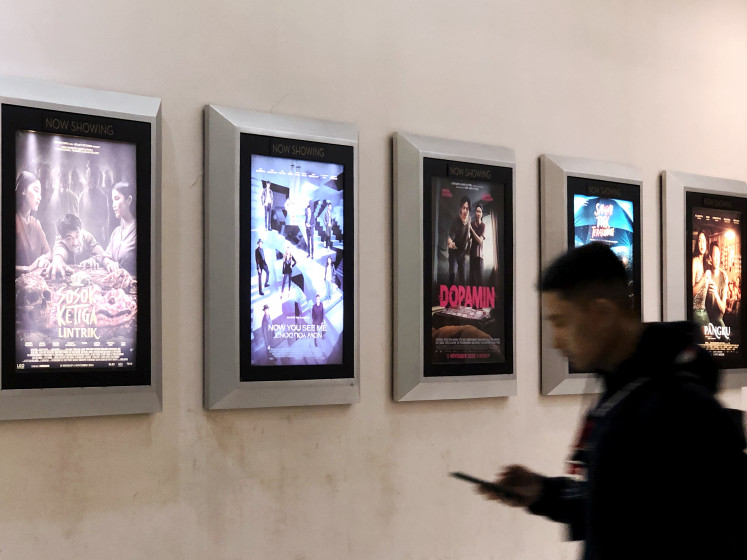Popular Reads
Top Results
Can't find what you're looking for?
View all search resultsPopular Reads
Top Results
Can't find what you're looking for?
View all search resultsChildren of the PKI claim their own independence
Bimo B
Change text size
Gift Premium Articles
to Anyone
Bimo B. Basworo, 12, never met his grandfather, Nyoto, once a leader of the outlawed Indonesian Communist Party (PKI).
Two years ago, when he came across an article about his grandfather, he gave it to his history teacher.
The story of the PKI in the article, Bimo said, was rather different to the one he had read in his history textbooks.
Nyoto was the second deputy of the PKI and a state minister under Sukarno during the 1960s. He helped rejuvenate the PKI two years after its first rebellion in the East Java town of Madiun in 1948.
Bimo said he had read a lot about the PKI in his school textbooks, but none of it was positive.
"I wanted my teacher to read this different (view of PKI) history and was hoping he would say something," Bimo told The Jakarta Post recently.
But although Bimo never received a response from his teacher, the boy found he had gained something that his mother, Nyoto's daughter, had lost for more than 40 years: The freedom to reveal one's identity as a family member of someone in the PKI.
Bimo's elder brother Aji Baskoro said he was not ashamed of being the grandchild of a PKI leader.
"Why should I be? History doesn't have one version only," 17-year-old Aji said.
Fiera Chandisa, 15, whose grandfather was a former PKI prisoner, agreed, saying many parts of history remained untold.
"We all know history belongs to the winner, in this case the power elite," Fiera said.
Like Aji, Bimo and Fiera, other relatives of PKI members have escaped from the shackles of political discrimination, thanks to the reform that began to sweep Indonesia in 1998.
Ribka Tjiptaning Proletariyati, the daughter of a former PKI prisoner, is among those who relish this new freedom. In winning back her civil and political rights, Ribka wrote two books, A Daughter of the Indonesian Communist Party, or PKI Enters Parliament and Aku Bangga Jadi Anak PKI (I'm proud to be a PKI daughter).
Ribka joined the Indonesian Democratic Party of Struggle (PDI-P) and now chairs the House of Representatives' Commission IX overseeing citizenship, labor and health.
In the past few years, those who have links to former PKI members have emerged from the shadows and made themselves heard. They have held public discussions to clarify the role of the PKI in the 1965 coup attempt, in which six Army generals and an officer were killed. The incident, known as the Sept. 30 Movement, triggered the slaughter of tens of thousands of PKI supporters nationwide and thrust Army general Soeharto into power.
In 2004, the Constitutional Court made an historic ruling, annulling an article in the 2003 election law that barred former political prisoners from running for legislative elections, on the grounds the law contradicted democracy and human rights provisions enshrined in the Constitution.
The ruling was followed by the publication of a flood of new books written by ex-PKI members and their families, all telling the other side of the PKI history.
"We feel it's important to have all of our stories documented, especially in the form of books, to balance the history of the PKI created by the New Order regime," said Utji Kowati Fauzia, the daughter of a former PKI prisoner.
She said the most difficult challenge she and her friends had faced was finding a good way to explain their PKI background to their children.
Bimo's mother Svetlana shared similar concerns.
"What I did was to take my little children to attend discussions and exhibitions on the PKI. In 1999, I took my sons to meet Xanana Gusmao (now prime minister of Timor Leste) in prison to see for themselves what being a political prisoner was all about," said Svetlana, who spent part of her childhood behind bars, with her mother and siblings.
She said these kinds of activities stimulated her sons, and boosted their interest in finding out the truth about history.
That the government has stopped airing Soeharto's propaganda film Pemberontakan G30S PKI (the Sept. 30th PKI Rebellion) on TV is a relief, Nyoto's wife, Sutarni, said.
But the 80-year-old found there had been plenty of attempts to remove the newfound freedom from the bookshelves.
The Education Ministry rewrote the school history books in 2004, mentioning the PKI as only one of several instigators of the 1965 upheaval. However, in 2006 the ministry restored the old version, on the grounds that positioning the PKI as the main perpetrator of the events was the most acceptable version for Indonesians. The ministry also admitted there was widespread public resistance to the earlier 2004 version.
"Our efforts are now directed to pushing the government to grant rehabilitation to former PKI prisoners and their families. The government must officially clarify the role of the PKI in the 1965 event," said Utji, a member of the Human Rights Victims Research Foundation.
She also urged the establishment of a commission of reconciliation to unite the descendants of the victims of the 1965 events, including the PKI and military or religious groups.
Not all PKI family members enjoy the new freedom, she said. In some villages in the Central Java towns of Cilacap and Tegal, a number of former PKI prisoners still have their ID cards marked with the ET (Eks Tapol or former political prisoners) code, while others cannot obtain lifetime ID cards.
Without such initiatives, Utji said, discrimination against PKI-linked individuals would be revived and national reconciliation would fail.










